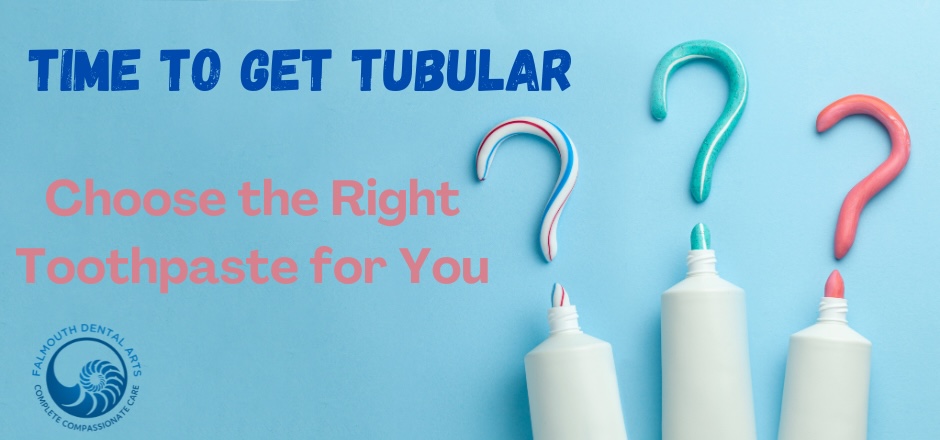
Aug 1, 2024
At the heart of every oral care routine is toothpaste. You brush your teeth twice a day, so you want to find the toothpaste that’s right for you. Visit any drugstore, however, and you can get overwhelmed by the amount of choices! How do you know which one is right for you and your needs? At FDA, we are always happy to assist our patients in making decisions about their well-being, whether that means choosing the right dental treatment plan or helping a patient set up a home care routine. In that spirit, here is some helpful information for choosing a toothpaste that’s right for you and your oral care.
ADA Seal of Acceptance
First things first – the ADA is a great resource when you’re looking for the best products to help maintain your oral health. When choosing a toothpaste, make sure you buy a product with the ADA Seal of Acceptance. They’ve done their research! Toothpastes with the Seal must contain fluoride and meet the ADA’s requirements for “safety and efficacy in reducing tooth decay.” So, look for their seal on any tube of toothpaste you are considering for your home oral care.
Next, you’ll want to consider your oral health care needs and priorities. Here are a few examples:
- Whiter Teeth: You can achieve a brighter, more confident smile with a whitening toothpaste. Look for a tube with ingredients such as carbamide peroxide or hydrogen peroxide; these are effective whitening agents. Please note whitening toothpastes can use abrasives and/or chemicals to polish teeth and eliminate surface stains, which may trigger a reaction in some people. FDA also provides both in-house and at-home whitening treatment options. Please give us a call to schedule a consultation with Dr. B or Dr. K if you’d like to learn more!
- Tartar Control: If your check-up revealed that you have a tartar issue, you may want to look for a toothpaste with extra tart control. Tartar is a hardened form of dental plaque and can lead to gum disease. Please note that tartar control toothpaste may cause sensitivity for some individuals.
- Sensitive Teeth: If you find yourself reacting when you come in contact with food or drinks that are cold or hot, you likely have sensitive teeth. There are a variety of reasons you may be experiencing sensitivity, from exposed dentin or receding gums. Fortunately, there are also toothpaste that can help lessen your sensitivity symptoms. For example, toothpastes with potassium nitrate can help soothe nerve endings, while toothpastes with chlorhexidine can help reduce plaque and prevent gum disease. One product we carry at FDA is MI Paste, which is fortified with calcium, fluoride and phosphate and helps replace minerals lost in the tooth’s structure. If you have concerns about your teeth sensitivity, your first step should be to come in for an appointment with Dr. Brunacini or Dr. Karagiorgos so they can assess your oral health and help you find the product that will best alleviate your sensitivity symptoms.
- All-Natural Ingredients: If you’re interested in a more organic lifestyle, consider an all-natural toothpaste free of harsh chemicals. For example, ingredients in traditional toothpastes, such as SLS, which acts as a foaming agent, can irritate some people’s gums. Choosing a natural toothpaste can be a great choice for both your oral health and the health of the planet!
- Toothpaste for Kids: We love getting kids to brush and often hear from our littlest patients that the taste of their toothpaste is important. Fortunately, you can now find way more exciting options than just minty fresh! From a berry-blast to a bubblegum sparkle, there are all sorts of fun flavor options out there. Beyond flavor, toothpaste for kids can often feature their favorite cartoon characters as well. Empower your little ones to participate in their oral care by letting them choose their own toothpaste.
Whatever tube of toothpaste you choose, make sure you brush those beautiful teeth of yours twice a day. If you still have questions about the best toothpaste for you, please give us a call at 207.781.5900. We’re here to be your partner in oral health!
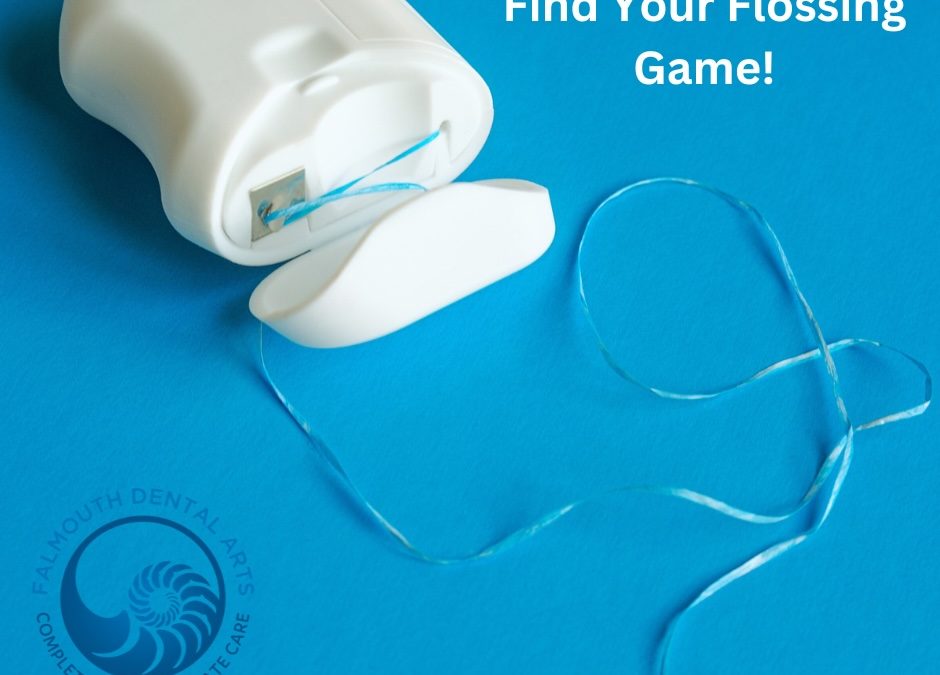
Jul 3, 2024
When was the last time you flossed? If it’s been awhile, you need to find your flossing game! Flossing is an important part of oral healthcare – as important as brushing! – and crucial to preventing gum disease. We know it can be difficult to fit flossing into your daily oral health routine. Don’t worry, the FDA team has you covered! Here are ways you can find your flossing game and clean those hard to reach places between your teeth!
Find the Right Time
What is the best time to floss? Anytime you will do it! If you find you’re tired at the end of the day and flossing is just too much to add to your nighttime routine, then try flossing in the morning! If your mornings are too hectic, try flossing after lunch! It doesn’t matter when you floss, it just matters that you make time for this healthy habit. Many of our hygienists love packing some Plackers in their purse so they can floss on the go!
Find the Right Floss
Some people find traditional flossing difficult. Whether it’s because you have mobility issues or because you have braces, that extra hurdle to flossing can make it feel impossible. Fortunately, there are alternatives you can explore!
- Water Flossers: You may have experienced this product in our office. Water flossers provide a way to clean around and between your teeth with a pressurized steady stream of water. They can be particularly helpful for patients with braces, dental bridges, dental implants, or gum pocketing. Look for one with the American Dental Association Seal (ADA) of Acceptance and get flossing!
- Interdental Brushes: These small, cone-shaped brushes are designed to be inserted gently between your teeth and can be rinsed and reused a few times. Combined with daily brushing, they can be as effective as flossing. Patients with braces, food traps, dental bridges, or mobility issues may find this is a good alternative.
Whichever option you choose, and whatever time of day works best for you, the most important thing to remember about flossing is to do it! So, find a routine that works for you and stick with it…your teeth and your gums will thank you! If you have any questions about flossing or need to schedule your next appointment, please give us a call at 207.781.5900. We are here to support you and provide the best oral health care possible!
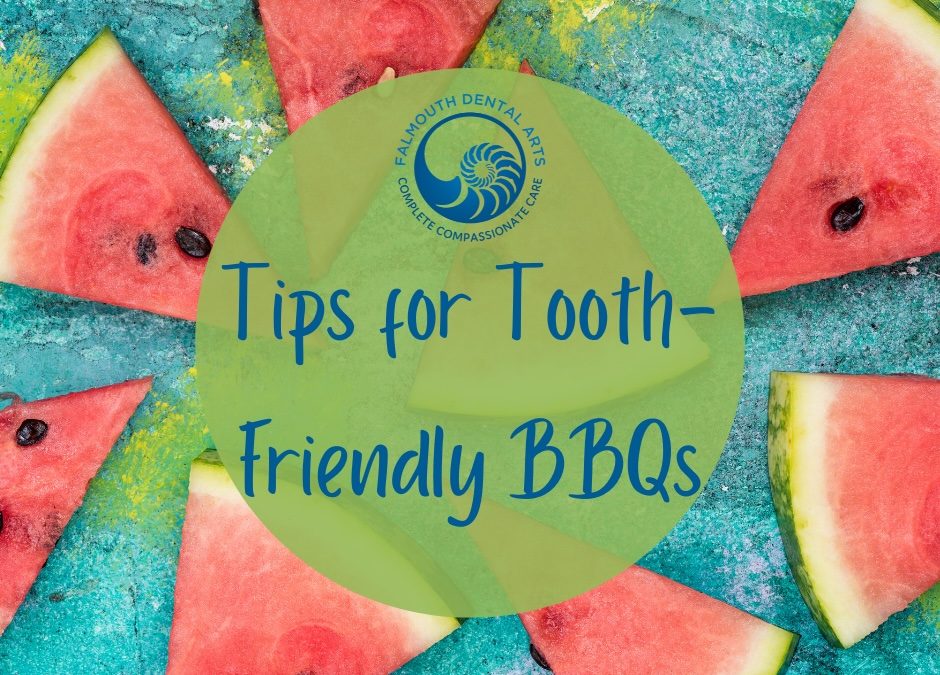
Jul 2, 2024
Summertime in Maine is the best! It’s full of beach days, popsicles, and backyard barbecues. While you grill up your hot dogs this summer, why not include some food that gives your barbecue an oral health boost? What you eat has an impact on your oral health as well as your overall health. There are foods that support healthy teeth and gums that are easy to include in your next summertime meal. To help inspire you, here are four tips from the FDA team to turn your summer gatherings into tooth-friendly affairs.
Add a Veggie Platter
While you’re waiting for the grill to heat up, put out a platter of fresh veggies for snacking. Crunchy veggies like celery, carrots, and cucumbers are great for your teeth; they stimulate saliva and help keep your teeth clean. Add a calcium-rich yogurt dip to your platter and you’ve leveled up your tooth-friendly snack. The probiotics in yogurt can help balance the pH level in your mouth and keep cavity-causing bacteria in check. Talk about a win-win!
Say Cheese!
Cheese is full of calcium and phosphorus, which helps strengthen and protect your teeth. Studies also show that including more dairy in your diet can help protect your gums. So, make that a cheeseburger, please!
Skip the BBQ Sauce
Have you ever looked at the ingredient list on BBQ sauce? It is full of sugar! Limit the unnecessary sweet sauce and load up on flavorful condiments like pickles and fresh tomatoes instead. Or find a sugar-free recipe and impress your guests with a home-made sauce!
Don’t Forget Water
Hot days call for cold beverages, but drinking soda is not great for your teeth or your health. All that sugar can cause cavities. Staying hydrated is important and drinking water is an easy way to boost your oral health at every meal. Like saliva, water will rinse away harmful bacteria and food particles. If you want to serve something more exciting than plain water, try adding cucumbers, strawberries, or mint to your water pitcher. Refreshing and flavorful!
We hope you are enjoying all that this Maine summer has to offer. If you have any healthy tips for summer BBQS or need to schedule your next appointment, please be in touch! We look forward to seeing you soon!
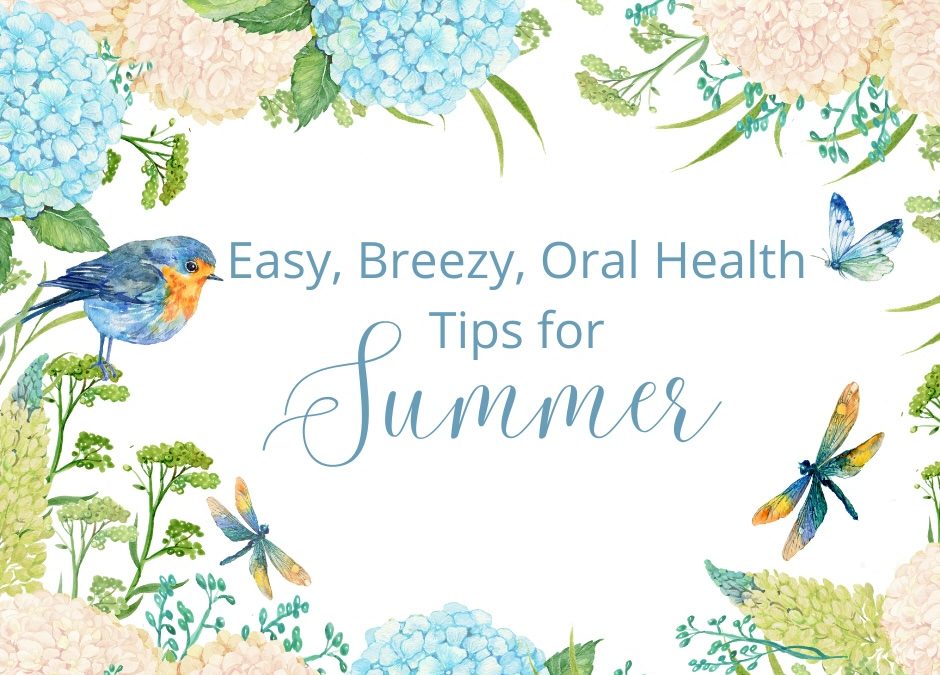
Jun 4, 2024
June marks the beginning of summer, which means summer vacation is here! However, that doesn’t mean you can take a vacation from your oral hygiene routine. At FDA, we’re your partner in oral health and here to help you develop a home routine that will keep you healthy and happy. After all, taking care of your teeth and gums is an important part of maintaining your overall health. Here are four easy tips to keep you smiling your way through summer.
Hydrate!
When the weather heats up, stay hydrated! Drinking enough water is good for your body and good for your teeth and gums. Like saliva, drinking plenty of water can help rinse away food particles and cavity-causing bacteria in your mouth. Plus nothing beats a cold glass of water on a hot day!
Floss on the Go!
Flossing is one of the best things you can do for your oral health. Floss gets into the nooks and crannies between your teeth that brushing alone doesn’t reach, removing plaque and bacteria. We know how hard it can be to incorporate flossing into your daily routine, and even harder when you’re packing in all the summer fun. Do yourself and your gums a favor by flossing on the go! Many of our hygienists swear by the floss picks, Plackers. Toss a few into your beach bag or suitcase so you can floss your way to a healthier smile!
Avoid Chewing Ice!
Summer is the perfect time to enjoy icy, cold beverages. Many people love to crunch on the ice after they finish the drink, but this bad habit can damage your teeth! Ice is hard enough to crack a tooth and we often see patients with chipped teeth. If you do chip a tooth, fret not, Dr. Brunacini and Dr. Karagiorgos can help repair any damage done, often in as little as two visits!
Visit the FDA Team!
An easy way to take care of your oral health is to come in for regular cleanings and check-ups with our compassionate team of oral health care professionals. Beat the heat and come in for an appointment in our cool and comfortable office. We’ll give you a thorough cleaning and check for cavities and gum disease, as well as do an oral cancer screening. Regular appointments with Dr. B & Dr. K can help prevent larger dental issues from developing and will keep your smile going strong.
If you need to schedule your next appointment, please give us a call at 207.781.5900. We’re here to provide you with the highest quality dental care in every season!
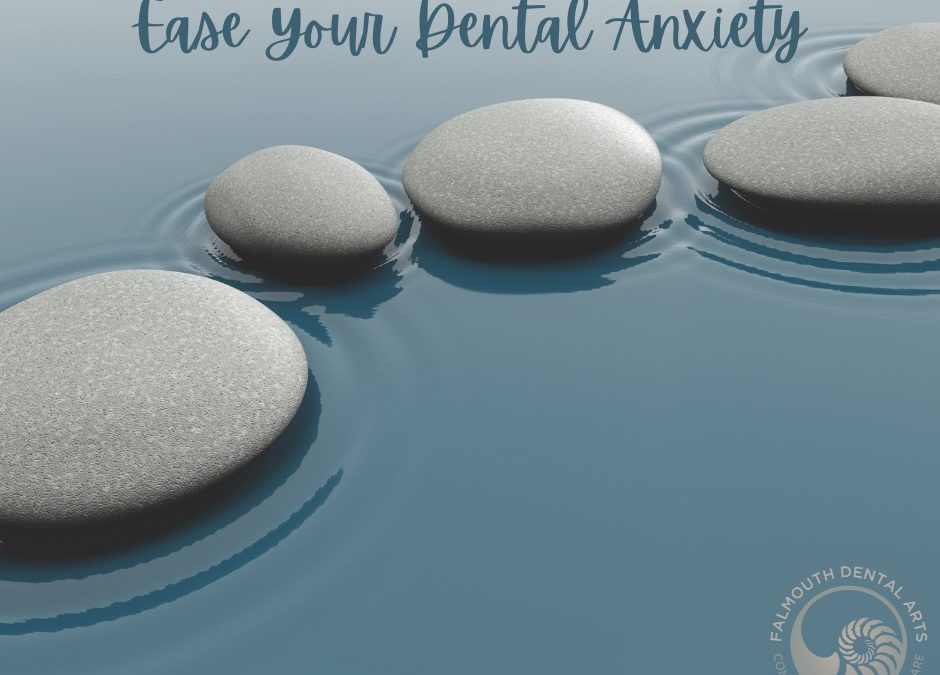
Jun 3, 2024
We get it. Not everyone loves coming to the dentist. In fact, it’s quite common to feel anxious about coming in for an appointment. At Falmouth Dental Arts, our approach to oral health care has always been patient care. For our team, it is about comfort in all aspects – from the scheduling, to payments, to the dental chair, and beyond – we want you to feel comfortable physically, and emotionally. We strive to make your appointments with us as easy as possible. If you find yourself feeling anxious before your next appointment, here are three easy ways to ease your dental anxiety:
Communication
If you experience fear or anxiety before or during your dental appointment, please tell us! Our team of compassionate dental professionals truly cares about the well-being of our patients and want to help you feel comfortable. We’ve heard from patients that talking through their fears and learning the step-by-step of a procedure can help alleviate anxiety. We are always happy to take the time to answer questions and to listen to you.
Distraction
If hearing and seeing the tools of the trade make you uncomfortable, distraction can be your friend at your next appointment. Directing your mind toward something you find more pleasant can often help reduce anxiety. We find that many patients like to bring headphones to their appointment so they can listen to music, a podcast, a book-on-tape, or even a guided meditation. Find something that puts you at ease and bring it in! If it’s a really good podcast…please tell us so we can check it out, too! 🙂
Deep Breathing
If you’ve ever meditated or been to a yoga class, you’ve likely experienced the effects of deep breathing. When you breathe deeply and slowly it provides your body with more oxygen and can be quite effective for calming your central nervous system. Practice deep breathing at home and as you come to your appointment. Our oral health care team can help remind you to keep taking deep breaths during your appointment as well. We are here to help!
If you have other tips or methods for keeping calm, cool, and collected and the dentist, please let us know! As always, we are here to provide you with the best dental care possible. If the above relaxation techniques don’t calm your fear, you may be a candidate for oral conscious sedation. Please give us a call at 207.781.5900 to set up a consultation with Dr. Brunacini or Dr. Karagiorgos to see if this is the right option for you. We’re here to be your partner in oral health and find a care plan that works for you!





